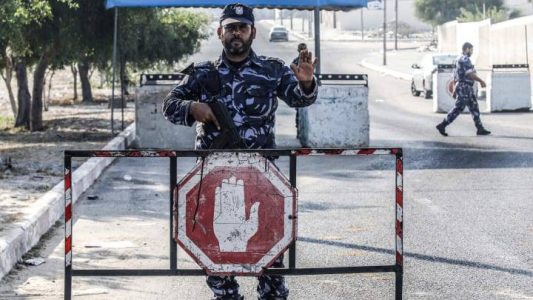
Hamas takes extraordinary step to quell Gaza’s ‘angry youth’
Something extraordinary happened in Gaza on Tuesday night. Three Palestinian policemen, Hamas people, were killed in two explosions that occurred at police checkpoints. A number of other people were injured. Later it emerged that the incidents were suicide attacks initiated by local activists, apparently people from a Salafi group linked to Islamic State.
Organizations of this sort, which the Israeli security establishment calls “rebels,” rely in part on activists who quit Hamas (and to a lesser extent Islamic Jihad), due to frustration with what they see as restraint on the part of Hamas vis-à-vis Israel.
The incidents reflect the magnitude of the ferment in Gaza with regard to the Hamas regime. Those same “angry youths” who Hamas accused of being behind a series infiltration attempts by armed cells, and sometimes lone operatives, from the Gaza Strip into Israeli territory, are also directing their anger at the government in Gaza. In response, Hamas’ internal security organization has embarked on a series of arrests of Salafi activists, whether on suspicion of involvement in these attacks or as a deterrent from additional moves against Israel.
In the background, in recent days as well, operatives of the “rebel” organizations fired a small number of rockets at Israeli communities along the border with Gaza. The intelligence community in Israel is sticking to its guns: These actions were not undertaken with approval from Hamas and not even with it turning a blind eye. The Hamas leadership in the Gaza Strip, which this week received another shipment of Qatari money, is interested at this stage in continuing with relative calm. There is a certain somewhat ironic resemblance between the behavior of Hamas and the conduct of the Palestinian Authority in the West Bank, where the resolution of its economic crisis vis-à-vis Israel last week could well ensure the continuation of close security coordination at least until the end of this year.
An unusual ruling on a point of Islamic law – a fatwa – issued by the Supreme Shar’ia Council in the middle of August can testify to current Hamas policy. The fatwa completely prohibits perpetrating any individual armed operations in the name of Islam – and relates clearly to the attempts to infiltrate Israel through the security fence and shoot at IDF soldiers deployed there. The committee describes the activists as individuals motivated in part by childish naivete. Others, it says, want to embarrass the Hamas government.
The Shari’a law experts added a number of arguments to the ruling. They argue that the activists do not have any military training and therefore the infiltrations were for the most part thwarted, without having caused any damage. Moreover, the infiltrations are not coordinated with top Hamas people and therefore expose them to Israeli retaliatory actions because they do not have enough time to get to shelters.
In addition to the practical justifications, there are also religious conclusions. A person who acts without authorization, ruled the council, will not be accorded the status of shahid (martyr) after his death. Hence, by implication, there is an economic threat – the Hamas government will not provide economic aid for the families of people killed in such incidents.
Source: Haaretz





